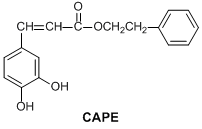Propolis (bee glue) is a mixture of tree resins and dyes collected from plants by honey bees, and their own secretion. Honey bees use it as a building material of the beehive, while humans have used its antibacterial and antitumor activities from B. C. E.
Caffeic acid phenethyl ester (CAPE) is a constituent of propolis, which has various bioactivities. It has been reported that CAPE inhibits NF-κB activation and has antineoplastic, antioxidant, anti-inflammatory, and cytostatic properties.
Maintenance Notice (3:15 - 7:30 AM February 22, 2025 UTC): This website is scheduled to be unavailable due to maintenance. We appreciate your patience and understanding.
Notice of Discontinuing the Use of Password-Protected Compressed Files | Product Document Searching Made Easy by 2D Code! | TCI Life Science News February 2025 | [Product Highlights] Chemiluminescent Reagents for... | Various analytical charts can be searched on each product detail page and Product Document Search (The kinds of analytical charts differ by product)
